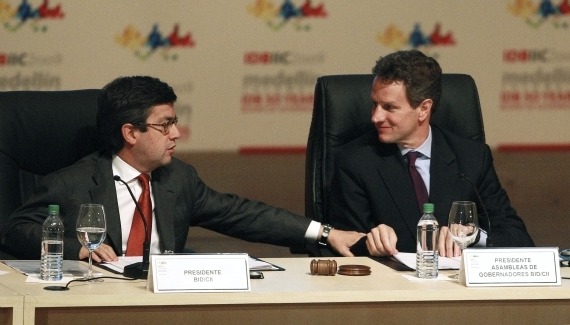Do U.S. Budget Cuts Threaten the IDB?
More on:

The Inter-American Development Bank (IDB) just finished its annual meeting that brought 29 finance ministers, including Mexico’s Ernesto Cordero, Colombia’s Juan Carlos Echeverry and the United States’ Tim Geithner, to snowy Calgary.
The ministers and their aides spent four days talking about swapping dollar loans into local currencies, infrastructure needs, and Chinese investment in the region. But one behind-the-scenes rumbling was the potential fallout from the current U.S. domestic budget showdown. Would the United States meet its 2011 commitment?
The largest of 48 shareholders, the U.S. has a 30% share in the IDB. The bank is now in the process of increasing its capital base by $70 billion (approved at last year’s Cancun meeting) – which will enable it to double the number of loans it makes. The first installment of the U.S.’ share -- $102 million -- is due in October.
As Republicans and Democrats square off over the budget, multilateral dues are easy victims. But the costs of this short-sightedness will be significant. Skipping out on IDB dues directly undercuts U.S. efforts to reach out to Latin America and its economic markets in the goal to double U.S. exports by 2015. By showing that the United States doesn’t put its money where its mouth is, it diminishes U.S. “soft power” in negotiations over trade deals, economic opening, and other multilateral issues such as global economic governance or even climate change. And for those that fear “losing” Latin America to China (an IDB member that will pay its dues), this is not the way to show that the U.S. cares.
IDB funds are especially important for the smaller and poorer countries in the region—such as the Central American nations the U.S. is working with on a range of issues, including regional security, migration, and job creation. IDB loans are often the glue that brings together other lenders for long term infrastructure and other development projects, all of which are crucial for the economic health of particular countries and the region as a whole. The IDB helps open up economies, strengthen property rights, allowing the private sectors (and often U.S. companies) to flourish.
So far the Department of Treasury has been out front, trying to save multilateral outlays. The State Department should be joining the bandwagon, as these dues are as important diplomatically as economically. Their joint efforts will surely be needed to convince a skeptical Congress that the IDB matters.
More on:
 Online Store
Online Store